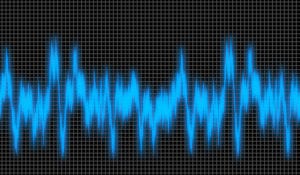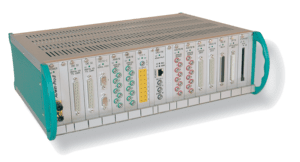Sophisticated Control System Handles Sensor Simulation
The aim of signal generation using an ADwin Control System is to produce signals which conform as closely as possible to the desired shape.
Waveform Generation
This field of application covers the whole range of automation, e.g.:
- Calculation of profiles for path control
- Control of electron beams, lasers and high voltage pulsers
- Dynamic excitation for determination of system characteristics
- Sensor simulation
- Signal excitation for functional and long-term test stands
- Adaptive signal generation
 High-Performance Modular Real-Time Control System
High-Performance Modular Real-Time Control System
Single- or multichannel waveform generators are used to create periodic or transient analog and digital signals. Frequency, phase and offset can be smoothly adjusted online, often in a single step. Users can also generate arbitrary waveforms by the superposition of various base signals.
The numerically generated waveforms can either be output directly or used internally as setpoint values for digital closed-loop or open-loop controllers running simultaneously on the same ADwin system. Additionally, input signals can be acquired and evaluated at the same time for monitoring limit values.
Additionally, users can set up complex controls by using the ADwin system’s capability of synchronously outputting multiple analog and digital signals on a time- or event-triggered base.
Of interest is the use of an ADwin system as an adaptive signal generator allowing the user to redefine during online operation, each signal property depending on the input values. The statement: “In principle, any waveform is possible” can be taken literally.
ADwin Pro-II System Features:
- Analog In (Multiplexed or Parallel A/D), Analog Out, Digital I/O, Counters, CAN, LIN, and Serial, Cards
- Up to 480 Analog Inputs, Digital I/O or a Combination
- With 1 GHz clock speed, 1 GB internal memory and 256 MB of RAM, the PRO-II’s processing power has grown considerably. In addition, the processor’s 64-bit internal calculation enables precise floating-point calculations.
- ADwin’s accelerated Ethernet interface enables high-speed data transmission to the PC at more than 10 Mbytes/s.
- Full, Half and Quarter-Rack Mainframes, AC or DC-Powered Versions
- Optional TICO Coprocessor Modules for Local Pre-processing
Real-Time for Complex Applications
ADwin’s data exchange with a PC is fully compatible to work with all the interfaces (for VB, Matlab, etc.) as usual. Users save considerable time by reusing valuable ADbasic source code after just a few changes to the tried and tested algorithms.
The Pro-II system’s extraordinary speed enables applications demanding a high data rate. In addition, the fast T-12 processor allows an intelligent pre-selection of relevant data, mathematical functions, or digital channel filtering.
All Pro-II modules run on the Pro-II backplane which allows fully synchronized time measurements from multiple modules without any special software effort.
ADwin’s XIINX runs at 1 GHZ. The T12 processor also has extremely short response times so your control or regulatory processes can run reliably on the T12 with cycle frequencies far above 1 MHz.
For more information on the ADwin-Pro-II Real-Time Control System, additional ADwin systems, signal generation or to find the ideal solution for your application-specific needs, contact a CAS DataLogger Application Specialist at (800) 956-4437 or request more information.

